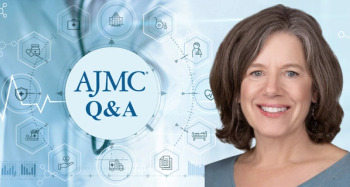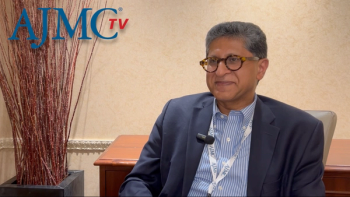
- June 2024
- Volume 30
- Issue 7
Bringing the Human Factor to the “Last Mile” of AI-Assisted Clinical Decisions
Clinical trials can demonstrate a drug’s efficacy and safety. Biomarker tests can match the right drug with the right patient. FDA can give its approval, and the National Comprehensive Cancer Network (NCCN) can add a new therapy to its guidelines.
After all this, however, there’s still an unknown in putting precision medicine into practice: the ability of busy oncologists to perform tests, read complicated reports, and use this information to prescribe the right drugs.
What CEO Rajni Natesan, MD, MBA, calls the “the last mile,” is what her company, Clarified Precision Medicine, is built to tackle: its mission is to erase the gaps that occur when the promise of precision oncology runs into the reality of a busy clinic. Although use of biomarker testing has improved in certain cancers,1 and evidence shows it is cost-effective,2 a March 2024 report in JCO Clinical Practice, published by the American Society of Clinical Oncology (ASCO), identified 7 pain points that kept 64.4% of eligible patients from benefiting from precision oncology in a 2022 study.3,4
What can be done? Natesan and the company’s cofounders see opportunities in the use of artificial intelligence (AI), backed by decades of experience from frontline oncologists. The company announced Natesan’s appointment April 16, 2024, along with news of $1.2 million in seed funding to advance its virtual tumor board model.5 Clarified combines an algorithm to analyze next-generation sequencing (NGS) results from a variety of laboratory tests; the process distills findings that are reviewed by oncologists to identify treatment options.
It's this human factor, Natesan explained, that sets Clarified apart. Oncologists in community practice, a chief target for Clarified, might be intrigued by what AI could do to lighten their workload, but nothing replaces a doctor to make decisions.
“We're in this world of genomics, where our insights and discoveries are burgeoning. We have incredible therapeutics on the market. We have incredible lab tests that have been developed,” Natesan said. Clarified’s role is “piecing it all together and bringing that innovation in an evidence-based way, according to medical management guidelines, to the patients that need it.”
The technology and review combination saves time for physicians who may see 30 patients a day—and who lack time to read a 40-page report that follows each biomarker test. “This is the last mile that we are looking to support,” Natesan said.
The experts who review reports and sit on Clarified’s board are an esteemed group. The company’s cofounders include:
- Lincoln Nadauld, MD, PhD, who served nearly 9 years as vice president and chief of precision health and academics for Intermountain Healthcare;
- Lisa Alderson, MBA, a former chief commercial officer at Invitae who is now CEO at Adela; and
- Howard McLeod, PharmD, FASCO, FCCP, professor and director, Center for Precision Medicine and Functional Genomics, Utah Tech University.
In addition, board members include Richard Schilsky, MD, FASCO, FACP, the former chief medical officer of ASCO and former chief of hematology/oncology at the University of Chicago Comprehensive Cancer Center, and Roy Beveridge, MD, the former chief medical officer at Humana and previously, The US Oncology Network and McKesson. A 2023 paper in JCO Oncology Practice called for precisely the model that Clarified has now executed, Natesan said.6
Nadauld, who serves as a senior reviewer, said in an email to Evidence-Based Oncology that Clarified addresses the time needed to interpret testing reports, which can be a barrier to use of precision oncology in practice. “Clarified provides clear and concise interpretations of complex genomic tests which saves me immense time with each case,” he said.
“The human reviewer is a critical component of Clarified's interpretations,” Nadauld said. “It's important to me as a clinician to know that another medical oncologist has reviewed the genomic test report and provided input.”
Multiple Settings, Test Types, and Pathways
Clarified’s technology is used in a variety of settings, Natesan said. It can clear out backlogs of biomarker tests at academic medical centers, where there are simply too many patients for each case to go to a molecular tumor board. The company’s focus, however, is on community oncology, where 80% of patients would prefer to receive cancer care.7
“When we think about how patients like to be cared for, for the most part it’s in their community setting right close to home,” Natesan said.
The AI technology is “agnostic and flexible,” she said, and can handle results from well-known commercial labs and from custom tests developed in academic settings. Notably, Clarified’s results can also solve for different clinical pathways, whether they are pathways from a national payer or those developed by a managed service network of community practices.
Clarified offers 2 products that provide guideline-based recommendations. The first, Clarified Select, looks at both somatic and germline data produced by lab tests, which can identify mutations and variants of unknown significance but cannot pronounce recommendations. Clarified’s algorithm then looks both “upstream” at what is triggering the cancer and “downstream” to potential treatments or clinical trials; its review process gives physicians information about preferred first- or second- or third-line therapy, along with supporting studies and documentation. The 40-page lab report is boiled down to a single page and names the experts who reviewed the case. “That becomes part of the medical record for the provider, that they can hang their hat on when they’re making therapeutic decisions,” she said.
A second product, OncoGuardian, focuses on potential gene-to-drug interactions and identifies other drugs, such as antidepressants or pain medication, which could be inappropriate for an individual patient. “It’s looking to reduce the toxicity for the patient, to keep them out of the [emergency department] or the intensive care unit,” Natesan said.
Response From Payers
Both products have been well-received by payers, she said. “Genomics is a relatively new field, and utilization is kind of getting off the ground. In certain geographies, it can be a little bit of the Wild West,” with both underutilization of testing as well as tests that are given but then not interpreted correctly.
“Our ability to inject a standardization into the field is very helpful to payers,” Natesan said. Second, getting practices to practice precision oncology correctly can save money. Nadauld was the senior author for a study of Clarified’s use within Intermountain’s health system, which found the technology produced an average savings of $7500 per patient in the first 8 weeks of a patient’s cancer diagnosis.8 Downstream savings can be even greater, Natesan said.
A current pilot with the AI-driven clinical decision support company, VieCure, is bringing precision oncology services to patients across Alabama Cancer Care, embedding the Clarified Select product into VieCure’s platform.9
Clarified seeks to not add time or upfront costs to a community practice. “Our goal…is to not have practices or patients pay for these services, which are beneficial for outcomes and already saving costs,” Natesan said. “Payers have been very receptive to covering our services, so much so that we have nearly 100 million covered lives to date, including Medicare coverage.”
Helping patients and providers understand the value of waiting for NGS results—and Clarified’s report—requires education. Oncologists must always explain to patients that it’s better to wait for test results than to risk being treated with the wrong therapy. “Within a day or 2—and usually far less time than that—we will post our recommendation as soon as the lab report comes back,” she said.
Clarified’s algorithm is regularly updated to account for new FDA approvals and updates to NCCN guidelines for more than 200 cancers, as well as what Natesan calls “a growing body of inputs” that include information on DNA, RNA, proteomics, multi-cancer early detection, and more. The AI capabilities might produce about 85% of the feedback, she said, with the last piece—physician review—being the most important part of the process.
“There’s reluctance, and rightfully so, in the market by physicians who say, ‘Do I trust this algorithm?’” Natesan said the group of physician reviewers brings “years of experience and that nuance…to be able to operate in the gray.”
“This is the exact balance that we are moving to in healthcare in general,” she said. “So, we’re really excited for this kind of model.”
References
- Yan JT, Jin Y, Lo E, et al. Real-world biomarker test utilization and subsequent treatment in patients with early-stage non-small cell lung cancer. Oncol Ther. 2023;11(3):343–360. doi:
10.1007/s40487-023-00234-7 - Mirza M, Goerke L, Anderson A, Wilson T. Assessing the cost-effectiveness of next-generation sequencing as a biomarker testing approach in oncology and policy implications: a literature review. Value Health. 2024;S1098-3015(24)02357-X. doi: 10.1016/j.jval.2024.04.023.
- Tsimberidou AM, Sireci A, Dumanois R, Pritchard D. Strategies to address the clinical practice gaps affecting the implementation of personalized medicine in cancer care. JCO Oncol Pract. 2024;
https://doi.org/10.1200/OP.23.00601 - Sadik H, Pritchard D, Keeling DM, et al. Impact of clinical practice gaps on the implementation of personalized medicine in advanced non–small-cell lung cancer. JCO Prec Oncol. 2022;6: e2200246
https://doi.org/10.1200/PO.22.00246 - Clarified Precision Medicine raises $1.2 Million in seed funding and appoints health tech leader Rajni Natesan, MD, MBA as CEO. News release. Financial Content. April 16, 2024. Accessed May 20, 2024.
https://bit.ly/4bTequj - West H, Lovely CM. Ferrying oncologists across the chasm of interpreting biomarker testing reports: systematic support needed to improve care and decrease disparities. JCO Oncol Pract. 2023;19:530-532. doi:
https://doi.org/10.1200/OP.23.0001 - Copur MS, Ramaekers R, Gonen M, et al. Impact of the National Cancer Institute Community Cancer Centers program on clinical trial and related activities at a community cancer center in rural Nebraska. JCO Oncol Pract. 2016;12(1):67-68. doi:
10.1200/JOP.2015.005736 - Haslem DS, Chakravarty I, Fulde G, et al. Precision oncology in advanced cancer patients improves overall survival with lower weekly healthcare costs. Oncotarget. 2018;9(15):12316-12319. doi: 10.18632/oncotarget.24384.
- VieCure to launch pilot program with Clarified Precision Medicine at ALCC to accelerate the adoption of precision oncology. News release. VieCure. May 31, 2023. Accessed May 22, 2024.
https://bit.ly/4dU0JNl
Articles in this issue
over 1 year ago
Using NLP to Find “Hidden” Patients for Clinical Trialsover 1 year ago
Can RWD Sources Estimate OS in Oncology Research?over 1 year ago
Chart Abstraction Pilot Improves Data Accuracyover 1 year ago
June 2024 Health Equity Newsover 1 year ago
CMS Reopens EOM With Payment Boost, Extends Model to 2030Newsletter
Stay ahead of policy, cost, and value—subscribe to AJMC for expert insights at the intersection of clinical care and health economics.









